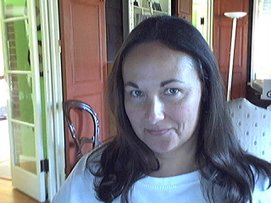I Stand Here iPodding - Part Three
What you needn't have and what you must--a favorites list.
There is one more program that is a must if you want to convert streaming media into mp3s for your iPod. Audacity is great for recording the audio from all kinds of streaming media. All you do is select "Stereo Mix" as your input source to take your computer's audio output and channel it back through as input. Then you can easily chop off the beginnings and the endings to get a clear track without unnecessary silence or jabber. Export the resulting project files to mp3 format and you are done! However, you are recording in real time, which means you don't want to be doing anything that could interfere with the media stream or compete with the sound you are trying to record. That means, for example, no web surfing or downloading of email while you record.
Now for my list of favorites:
Municipal and Other Public Libraries
The Library of Congress maintains an index of poets, novelists and other writers whose work is broadcast on the web.
The San Francisco Public Library has over 1200 downloadable audio books (free account needed) and the New York Public Library also permits download of audio material.
Universities
University webcasts are ubiquitous these days but here are some I favor:
The University of Pennsylvania's archive of literary webcasts, Penn's larger list of media links, and Penn's digital poetry archive.
UC Berkeley, mentioned in Part Two, has an archive of downloadable media in various formats. Also check out the webcast.berkeley Courses Schedule.
Similarly, MIT has OpenCourseWare and video lectures. There are Princeton event videos. There are Stanford free lectures. Purdue has complete lectures of select classes.
Columbia University's Fathom Archive offers access to a wide range of free content, including lectures, articles, interviews, exhibits and free seminars. You can also find some great lectures about literature here: http://ci.columbia.edu/ci/subjects/literature.html.
Stores and Publishers
Barnes & Noble's Meet the Writers Podcast features many hours of video and audio interviews. Also check out the Amazon Wire. The Tattered Cover, a splendid independent bookstore, features a podcast I mentioned previously, called Authors on Tour. As for publishers, there is The Penguin Podcast. Simon & Shuster's got one, too. Also check out the one by Canada's Raincoast Books.
TV, Radio, and Newspapers
Booknotes, on CSPAN, has 15 years of televised book interviews. NPR has a host of audio material relative to books. Also check out the wealth of downloadable material on writing, poetry and books from the BBC. ABC Radio National in Australia has a daily book show that's very good, The Book Show. Michael Silverblatt is a terrific literary interviewer, and there is a podcast of his KCRW show, Bookworm, here.
Another worthy archive features Don Swaim's conversations with prominent writers. His show, Book Beat, aired on CBS radio (AM stations) from 1982 to 1993. Short segments can be downloaded from the Dom Swain website, while full-length, unedited recordings can be downloaded from Ohio University's Wired for Books.
For an exhaustive list of public radio (and TV) stations that feature live web broadcasts and podcasts, including literature and drama programs, see Public Radio Fan.
As for newspapers, there's the New York Times' Books podcast, and from the UK, there's the Times Online Books Podcast.
Authors and Publicists
Bill Thompson maintains a growing list of author websites on his podcast's website here, and many of these authors post readings and interviews or links to them that can be downloaded. Publicists are getting in on the podcast act also. TriCom Publicity, Inc. has one featuring its clients, called Authors in Your Pocket, and it's an excellent model.
Foundations/Nonprofits/Journals
The Lannan Foundation podcasts are superb. Also check out Lannan.org for more downloadable audio, and video, too, including archived interviews conducted by Michael Silverblatt.
The Academy of American Poets hosts a podcast as well as an audio archive. You can find them both here.
Also check out Nextbook , which was established to be a gateway to Jewish literature, and features a podcast and lots of downloads.
Not many literary reviews publish podcasts. I mentioned PodLit previously, and now I've found The Chattahoochee Review podcast. The Chattahoochee Review is a literary quartly published by Georgia Perimeter College. Their podcast is a mixture of interviews, readings and lectures, of varying lengths. There are also audio downloads at The Paris Review, but no official podcast.
Additional Goodies
This isn't a podcast but I found it while looking for one at The Paris Review. Thanks to an NEA grant and other support, The Paris Review now has an archive called The DNA of literature, containing over 50 years of their "Writers at Work" interviews, and they are all available online, for free. What a tremendous resource.
This isn't a podcast either but I want to mention it here anyway: LibraryThing. It's an online service that helps you catalog your books. You can access your own catalog from anywhere, even a web-enabled phone. LibraryThing connects people who own the same books, and comes up with suggested reading. You can have a free account and catalog your first 200 books for free. After that there is a modest fee. Just enter the book's ISBN or a keyword and up pops the rest of the indexing data. LibraryThing fills in the blanks from public sources like Amazon and the Library of Congress. Then just click on the book to add it to your catalog. You can even create notes -- such as links to relevant digital media. It's extremely cool. You'll find it a lot easier than using Excel or home library software -- and now you know what I was referring to when I said what you needn't have in the title of this piece.
